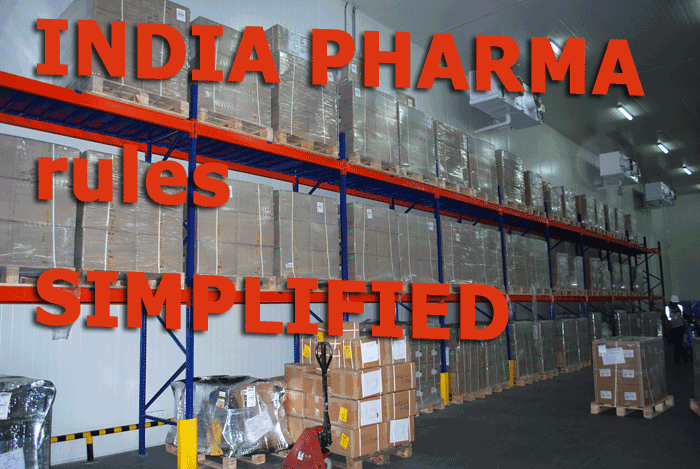
India’s pharma exporters received
a bonus recently when the government-controlled Central Drugs Standard
Control Organization (CDSCO is the national regulatory body for Indian
pharmaceuticals and medical devices and is similar to the Food and Drug
Administration of the United States) ordered that pharma exports did not
need any clearance from drug regulatory authority.
For the record, pharma exports to the U.S.,
Canada, Japan, Australia and European Union had not needed a No-Objection
Certificate (NOC) for export consignments.
Now, however, the Drug Controller General of India (DCGI) has included
all countries in the rule.
Exception
To The Rule
There is a rider to the new bill: the NOC
is not needed if the shipping bills were filed by the manufacturer with
a valid license under the Drugs and Cosmetics Act and Rules.
The order, a part of the government’s
ease of doing business, also mentioned that the move had been taken to
simplify regulations for exports of drugs, medical devices and cosmetics.
“This is being done to bring ease
in the drug regulatory practices in India relating to export of drugs,
medical devices and cosmetics.
“All the stakeholders are however
required to comply with the regulatory requirements of the importing countries
as per their specific needs,” the DCGI notice mentioned.
Timing Is
Critical
 The
order came at a crucial juncture: the country’s pharma exports totalled
$16.8 bn in 2016-17, according to figures put out by the Pharmaceuticals
Export Promotion Council. The
order came at a crucial juncture: the country’s pharma exports totalled
$16.8 bn in 2016-17, according to figures put out by the Pharmaceuticals
Export Promotion Council.
Pharma exports are slated to grow by 30
percent to reach $20 bn by 2020.
Commerce and Industry Minister Suresh Prabhu,
who is in charge of Civil Aviation too, is keen to boost exports.
His ministry has chalked out a strategy
to increase the country’s share of global trade to GDP by 40 percent.
Today, exports make up only 18 percent of
the $2.6-trillion GDP, the fifth largest in the world after the U.S.,
China, Japan, Germany and Britain.
India’s share in global trade is a
mere 2 percent.
Sometime ago, he had said that the government
was in the process of “preparing a new strategy for diversifying
our export basket to ensure that we export to new markets and ship out
new products”.
Complaints
Drive Change
Pharma exporters told ACNFT that CDSCO’s
move had come after prolonged complaints from buyers. Shipments of emergency
medicine and medical-related supplies were delayed due to the time taken
for paperwork.
Additionally, because of the delay, shipments
had to be airfreighted making them more expensive than supplies from China
and Taiwan.
Indian Pharmaceutical Alliance
 Hailing
the ‘No NOC’ for pharma exports as a move that would reduce
paperwork, Dilip G Shah, Secretary General of the Indian Pharmaceutical
Alliance (representing research-based national pharmaceutical companies),
said that the initiative would also reduce corruption. Hailing
the ‘No NOC’ for pharma exports as a move that would reduce
paperwork, Dilip G Shah, Secretary General of the Indian Pharmaceutical
Alliance (representing research-based national pharmaceutical companies),
said that the initiative would also reduce corruption.
“It is a part of ease of doing business
for the manufacturers exporting their products to other countries,”
he said and pointed out, that “the move will encourage hassle-free
exports to other countries”.
“Getting a NOC from CDSCO did not
mean that the quality of the products was guaranteed,” said Shah.
“Obtaining a NOC was only adding to
the paperwork and corruption.
“This move will help end malpractices
and unnecessary delay,” Shah said.
Rating agency Crisil, which predicted a
growth rate of 14-15 percent in FY18 (April 2017-March 2018) for the Indian
air cargo segment against the 12 percent growth in FY17, pointed out that
the National Civil Aviation Policy 2016 had paved the way for single window
clearance.
That has resulted in the dwell time for
imports and exports coming down: from 72 hrs to 48 hrs.
Pharma Lifting
Airports & Carrier Alliances
 For
the pharma sector, the reduction in dwell time has come as a boon and
international cargo carriers are keen to boost capacity from India. For
the pharma sector, the reduction in dwell time has come as a boon and
international cargo carriers are keen to boost capacity from India.
Take, for instance, the agreement between
Jet Airways and Air France-KLM.
While passenger numbers are expected to
go up, the tie-up will be leveraged by Schiphol Airport for cargo from
India.
Bart Pouwels, currently Director Business
Development Cargo at Amsterdam Airport Schiphol, who will lead the cargo
team in the new Schiphol aviation department, speaking about the cooperation
agreement had said:
“With the expansion of the joint venture
KL-9W we expect more direct flights between two nations.
“That gives us more cargo capacity.
“Recently 9W introduced a direct service between Bangalore and AMS.
“From AMS, this makes a weekly total
of 14 flights to Delhi, 10 flights to Mumbai and 7 flights to Bangalore.”
 The
80% Factor The
80% Factor
Perhaps, what has made the environment more
conducive for international air cargo operators, more than 80 percent
of Indian cargo (both exports and imports) are served by international
carriers, is the fact that cargo frequencies are not dependent on bilateral
rights.
As Cathay Pacific’s Anand Yedery,
Regional Cargo Manager, South Asia, Middle East and Africa told FT:
“We are keeping tab on the market
and frequencies will be increased or new destinations launched to meet
the market demands.”
Tirthankar Ghosh
|





